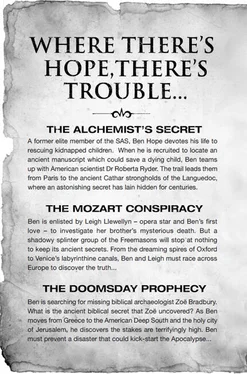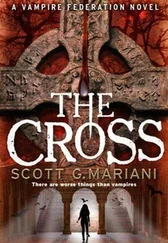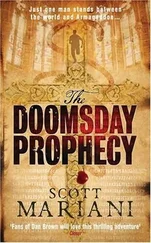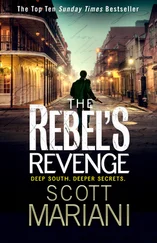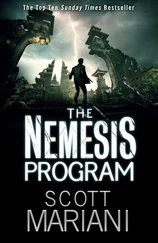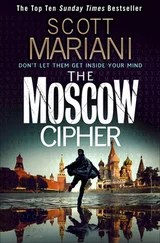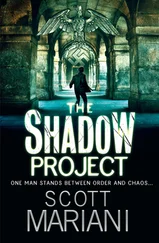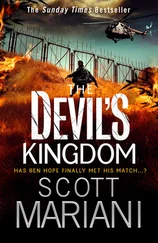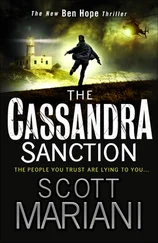‘They’d have caught you, or shot you too,’ Ben said. ‘You did the only thing you could. How many of them were there?’
‘I don’t know,’ the priest groaned. ‘Dozens. They weren’t regular troops. Maybe a drug gang, though the Lord knows what they were doing so far upriver. Their leader was—’
‘A man in a suit?’ Nico growled. ‘Black hair, early forties?’
Scally nodded.
‘Serrato,’ Nico said.
Chapter Fifty-Seven
Rumi screamed and writhed on the bare patch of earth among the trees. Half blinded by the agony and the bright lights shining in his face he clutched his shattered, bloody kneecap with both hands.
The man who’d fired the shot stood over the young Indian, lining the pistol up to blow away the other kneecap on his boss’s command.
‘That may refresh his memory,’ Serrato said. ‘Now ask him again.’
Raoul Bujanda was one of several of the hired guns who could speak Quechua. He kicked Rumi savagely in the stomach. ‘Where’s your village?’ he yelled. ‘Tell us, you filthy fucking savage.’
Rumi’s wide, desperate eyes locked on those of his daughter Chaska, in the strong grip of one of the men with a pistol to her head and his hand over her mouth. Her face was streaming with tears. Powerless to help her, he stared around him at the rest of the men standing on the river bank. There were so many of them. More were sitting in the strange boats bobbing on the water a few metres away. There was no possible chance of escape. Nobody was coming to save them.
Serrato opened his clenched fist. The gems of the necklace and bracelet that they’d taken from this Indian sparkled in the torchlight. ‘Tell him we only want the white woman who is being harboured by his tribe. If he helps us, he and his little girl can go free, and he has my word that none of his people will be harmed. But if he refuses, he’ll watch her die before he does.’
Rumi listened in stark horror as the grinning Bujanda translated. Chaska struggled and tried to scream, but the man holding her wouldn’t let her budge an inch.
‘Don’t hurt her,’ Rumi sobbed. ‘Please!’ There was only one thing he could do. ‘I’ll tell you how to get there. It’s not very far.’
‘You believe a lying Indian, boss?’ Vertíz asked Serrato.
‘I believe any father who wishes to protect his child,’ Serrato replied. ‘Get him to point out the exact location of the village on the map,’ he ordered Bujanda. ‘Then kill them both.’
A few minutes later, two shots rang out over the river. Rumi’s last scream was cut short. Serrato watched as the bodies were dumped in the bushes, then ordered his men back to their boats.
The long search was finally over. ‘Check your weapons,’ he commanded. ‘Full magazines. Whatever we find there, we kill.’
‘The woman too?’ Vertíz asked.
‘Her most especially,’ Serrato said. ‘But nobody touches her except me. Is that understood?’
The outboard motors revved. White foam churned from the propellers. The speedboats pulled away from the bank and took off in formation up the river.
Chapter Fifty-Eight
‘It was Rumi who had the jewellery,’ Brooke was saying. ‘If Serrato found it when he captured him, you can be sure he’s on his way here to find me.’
‘These people are tough as old boots,’ Ben said. ‘You don’t know that Rumi would have told them anything.’
‘I do know Serrato,’ Brooke answered. ‘Better than you, Ben. I’ve seen the things he’s capable of.’
‘She’s right, man,’ Nico said. ‘If Serrato got him, he talked. No question. Forget all your interrogation resistance bullshit. Nobody holds out. Not even the toughest.’
The three of them were grouped together with Pepe at the far end of the sick bay. At the other end, Father Scally was lying on the bed that had been Brooke’s. He was asleep, completely worn out from his sprint through the jungle. Tica and Kusi were sitting with him. Tica was sobbing quietly in mourning for Uchu and her missing friend Chaska. It wasn’t generally expected that she or her father would ever return.
‘And that means he’s on his way,’ Brooke said. ‘In fast boats, with all his men. I counted about thirty of them. Could be more. And they could be here any minute.’
Pepe shook his head. ‘Maybe not that soon. I know this river. Look.’ He crouched down and used the tip of his machete to trace a curving line on the earth floor. ‘See how the river bends? This is us’ – marking the spot with his finger –‘and this is more or less where the preacher said the attack happened. Get what I’m saying?’
‘It’s a lot farther round by river than by land,’ Ben said.
‘Miles and miles farther. And these guys don’t know the terrain the way the preacher does,’ Pepe added. ‘By cutting cross-country he gained a whole lot of time on them. I’d say that even if it didn’t take the fuckers long to get Rumi to talk, we still have at least an hour before they get here. Maybe two. The landing place ain’t exactly easy to find.’
‘You’d better move your boat upriver a way and make sure it’s well hidden,’ Ben advised him.
‘An hour or two still ain’t long,’ Nico said. ‘And time isn’t all we don’t have. What are we supposed to fight with, bows and arrows?’
Ben thought for a moment. ‘I need to go and see Tupaq.’
The chief was alone in his hut when Ben was shown inside by the surly Waskar. Pepe, Nico, Brooke and a crowd of other tribespeople filtered in behind him until the hut was teeming with bodies. The Sapaki people were all looking to Ben and Pepe in hushed anticipation.
‘War is coming,’ Ben said to Tupaq. ‘You asked for my help against these men. Now you have it. But without weapons, there’s little we can do to resist them. You understand?’
‘We have weapons,’ was Tupaq’s response after Pepe had translated for him.
Ben shook his head. He pointed at an ornate blowpipe that hung from the hut wall. ‘I respect your traditions. But these things your people have used for centuries, they’re useless against automatic rifles.’
‘I don’t think they have a word for “automatic rifles”,’ Pepe said.
‘That kind of sums up the whole fucking problem we’re facing here,’ Nico grunted.
‘Ask him if he has any other weapons in the village,’ Ben told Pepe. ‘Any kind of gun at all.’
Tupaq reflected solemnly with his lips pursed. After some deliberation he pressed his hands to his knees, slowly rose from his seat and motioned for them to follow him out into the night. A few steps away was another hut, longer and narrower than the normal tribal dwellings. As the chief led them inside, Ben saw that that was because the hut wasn’t for habitation, but a private storeroom for the village’s head man.
Tupaq spent a few moments bustling about, shifting things from place to place. Then he gave a grunt and beckoned Ben over to his side. He was standing over a wooden box, battered and aged, over five feet from end to end, less than a foot deep or wide.
Pepe translated as Tupaq talked: ‘Uh, he says it was his father’s, and his father’s before him, going back and back.’
The box was decorated in tribal style, but Ben could instantly tell that it hadn’t been made here in Peru, or anywhere else in South America. It was a British Royal Navy ordnance crate dating back some two centuries.
Tupaq lifted the box’s lid. Inside was a five-foot-long slender object wrapped in cloth. He lifted it out and set one end of it on the ground with a heavy ‘clunk’. It was almost as tall as he was. He looked at Ben, then unwrapped the cloth and handed it to him.
Ben blinked. He remembered something he’d once read: how during the struggle for Peruvian independence in the era of the Napoleonic Wars, British military and naval intelligence had been involved in a complex web of intrigue aimed at helping to loosen the ages-old grip of the Spanish on the country. Royal Navy frigates had landed on the east coast of South America around 1815 – and what he was holding in his hands was one of the relics left over from that time. God alone knew how it had found its way out here into the jungle, but it had.
Читать дальше
Конец ознакомительного отрывка
Купить книгу
